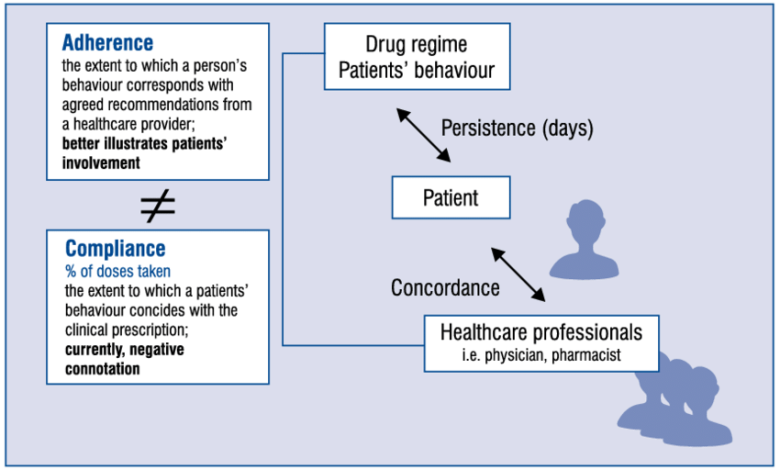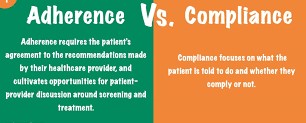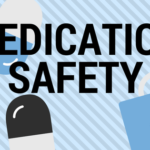Medication Adherence Vs Compliance

Medication adherence and medication compliance are two concepts that are often used interchangeably in the healthcare industry. Both refer to the extent to which patients take their medications as prescribed. However, there are some important differences between the two.
Studies have shown that both are unfortunately relatively uncommon. One study conducted in the United States found that only about 50% of patients with chronic medical conditions take their medication as prescribed. Another study conducted in Europe found that medication adherence rates ranged from 17% to 98%, depending on the type of medication and the condition being treated.
Similarly, medication compliance rates have also been found to be low. A review of studies on medication compliance found that, on average, only about 50% of patients comply with their medication regimen as directed by their healthcare provider.
In this article, we will discuss the difference between medication adherence and medication compliance, their importance, and how they impact patient outcomes.
Medication Adherence
Medication adherence refers to the extent to which patients take their medications as prescribed by their healthcare provider. It is a complex behavior influenced by various factors such as patient beliefs, perceptions, and social support. Adherence is a multifactorial issue and varies based on patient population, disease state, and medication class.
Non-adherence to medications is a significant issue in healthcare, with estimates suggesting that up to 50% of patients do not take their medications as prescribed. Poor adherence has been associated with negative health outcomes, increased healthcare utilization, and higher costs.
Reasons for medication non-adherence may include:
1. Forgetfulness
2. Fear of side effects
3. Perceived lack of efficacy
4. Medication cost
5. Difficulty understanding medication instructions
6. Complexity of medication regimen
7. Cultural beliefs
8. Lack of social support
Improving medication adherence can significantly improve patient outcomes and reduce healthcare costs. Healthcare providers can improve medication adherence by engaging in shared decision-making with their patients, simplifying medication regimens, providing clear instructions, and addressing medication-related concerns.
Medication Compliance
Medication compliance refers to the extent to which patients follow their healthcare provider’s instructions regarding medication use. Compliance is often viewed as a passive process where patients follow their healthcare provider’s instructions without understanding the rationale behind the medication or being involved in the decision-making process.
Compliance is often associated with medication-taking behavior that is dependent on the patient’s perception of their healthcare provider’s authority. In contrast to adherence, compliance is often viewed as a one-way relationship where the healthcare provider makes the decision, and the patient follows it.
While medication compliance is important, it has limitations. Patients who comply with their medication regimen may still have poor outcomes if they do not understand the rationale for the medication, experience side effects, or have other medication-related concerns.

The Importance of Medication Adherence and Compliance
Medication adherence and compliance are both essential for achieving optimal health outcomes. However, there are some differences between the two.
Medication adherence is a more comprehensive concept that considers various factors influencing medication-taking behavior. Adherence focuses on a patient-centered approach, where the healthcare provider engages the patient in shared decision-making and addresses concerns related to medication use.
Compliance, on the other hand, is a more passive concept that focuses on the patient following the healthcare provider’s instructions. Compliance is often viewed as a one-way relationship that does not involve shared decision-making or addressing patient concerns.
Improving medication adherence and compliance can significantly improve patient outcomes and reduce healthcare costs. Healthcare providers can improve medication adherence and compliance by engaging in shared decision-making with their patients, simplifying medication regimens, providing clear instructions, and addressing medication-related concerns.
How To Improve Medication Adherence And Compliance
Improving medication adherence and compliance can be a challenging task, but there are several strategies that can be helpful. Here are some tips:
1. Education: Providing education to patients about the importance of medication adherence and compliance can help them understand why it’s necessary to take their medication as prescribed.
2. Simplify medication regimens: Patients may be more likely to adhere to their medication regimens if they are simpler and easier to follow. Simplifying medication regimens can involve strategies such as reducing the number of medications, decreasing the frequency of doses, or using combination pills.
3. Pill organizers: Using pill organizers can help patients keep track of their medications and remember to take them as prescribed. Pill organizers can be purchased at most drug stores and come in a variety of shapes and sizes.
4. Medication reminders: There are several medication reminder systems available that can help patients remember to take their medication as prescribed. These can include smartphone apps, text message reminders, or alarms set on a watch or phone.
5. Patient counseling: Patients may benefit from counseling with a healthcare professional or pharmacist to discuss medication adherence and compliance. Counseling can help identify barriers to adherence and develop strategies to overcome them.
6. Incentives: Incentives such as rewards or prizes can be effective in motivating patients to adhere to their medication regimens.
7. Family and social support: Family members and friends can provide support and encouragement to patients in adhering to their medication regimens. Social support can be helpful in addressing stressors and barriers to adherence.
8. Follow-up: Regular follow-up with healthcare providers can help ensure that patients are adhering to their medication regimens and address any issues that may arise.
Conclusion
Medication adherence and compliance are two essential concepts for achieving optimal health outcomes. Adherence focuses on a patient-centered approach that considers various factors influencing medication-taking behavior, while compliance is a more passive concept that focuses on the patient following the healthcare provider’s instructions.
Healthcare providers can improve medication adherence and compliance by engaging in shared decision-making with their patients, simplifying medication regimens, providing clear instructions, and addressing medication-related concerns. By doing so, healthcare providers can significantly improve patient outcomes and reduce healthcare costs.





